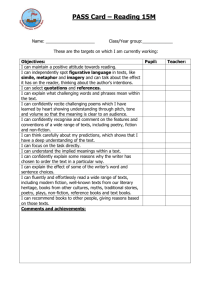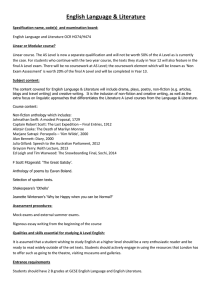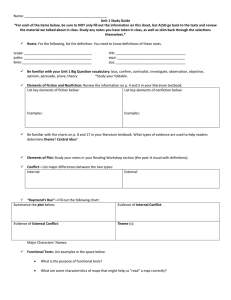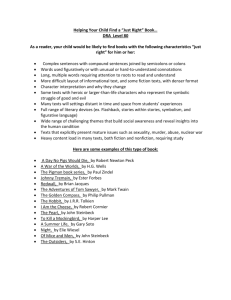O level English Language 1123
advertisement
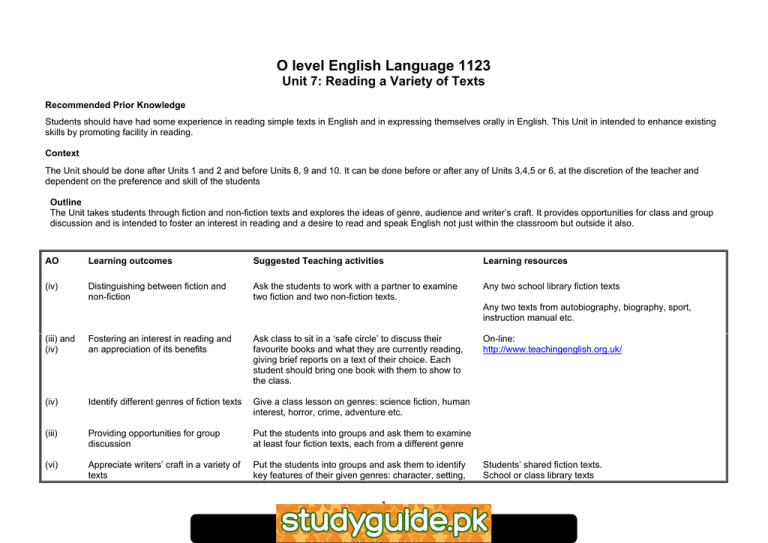
O level English Language 1123 Unit 7: Reading a Variety of Texts Recommended Prior Knowledge Students should have had some experience in reading simple texts in English and in expressing themselves orally in English. This Unit in intended to enhance existing skills by promoting facility in reading. Context The Unit should be done after Units 1 and 2 and before Units 8, 9 and 10. It can be done before or after any of Units 3,4,5 or 6, at the discretion of the teacher and dependent on the preference and skill of the students Outline The Unit takes students through fiction and non-fiction texts and explores the ideas of genre, audience and writer’s craft. It provides opportunities for class and group discussion and is intended to foster an interest in reading and a desire to read and speak English not just within the classroom but outside it also. AO Learning outcomes Suggested Teaching activities Learning resources (iv) Distinguishing between fiction and non-fiction Ask the students to work with a partner to examine two fiction and two non-fiction texts. Any two school library fiction texts Any two texts from autobiography, biography, sport, instruction manual etc. (iii) and (iv) Fostering an interest in reading and an appreciation of its benefits Ask class to sit in a ‘safe circle’ to discuss their favourite books and what they are currently reading, giving brief reports on a text of their choice. Each student should bring one book with them to show to the class. (iv) Identify different genres of fiction texts Give a class lesson on genres: science fiction, human interest, horror, crime, adventure etc. (iii) Providing opportunities for group discussion Put the students into groups and ask them to examine at least four fiction texts, each from a different genre (vi) Appreciate writers’ craft in a variety of texts Put the students into groups and ask them to identify key features of their given genres: character, setting, 1 www.xtremepapers.net On-line: http://www.teachingenglish.org.uk/ Students’ shared fiction texts. School or class library texts AO (vi) Learning outcomes Evaluating fiction texts Suggested Teaching activities Learning resources theme, plot typical of that genre. English Language And Literature (Toner and Whittome) Ch 1 Ask each student to write a short commentary on the key features (as identified above) of at least one of their given genres of fiction texts. Students’ shared fiction texts. School or class library texts Ask the students to read and evaluate the blurb on the back of at least two of their given genres of fiction texts. (ii) Writing about fiction texts Ask each student to invent a title for a fiction text in any genre and write a blurb for their imaginary text (maximum 50 words). Both title and blurb should reflect the chosen genre. Ask the students to redraft their blurbs so that they could be used as classroom displays. (iv) Understanding different genres in non-fiction texts Ask the students to examine key features of different genres of non-fiction texts. (iii) Understanding audience in non-fiction texts Ask the students to work with a partner to discuss the different audiences addressed in a selection of nonfiction texts. (vi) Understanding language in non-fiction texts Ask the students to work with a partner to examine language and tone in a selection of non-fiction texts. Texts from school library - autobiography, travel, sport, biography, etc. English Language And Literature (Toner and Whittome) Ch 1 (iv) Identify key features of different genres of non-fiction texts Put the students into groups and ask them to examine at least four non-fiction texts, each from a different genre. On-line: http://www.bbc.co.uk/schools/gcsebitesize/ (genre, examples and worksheet) On-line: http://www.bbc.co.uk/schools/gcsebitesize/ (audience, types of audience and examples) 2 www.xtremepapers.net AO Learning outcomes Suggested Teaching activities Learning resources (iv) Writing about texts Ask each student to write a short commentary on the key features of at least one of these non-fiction texts. On-line: http://www.bbc.co.uk/schools/gcsebitesize/ (emotive language, informative language, tone and language) http://www.bbc.co.uk/schools/gcsebitesize/ (non-fiction texts, opinions and facts, genre, audience, purpose of a text) (iii) Providing opportunity for pair discussion Ask the students to work with a partner to discuss key features of at least four non-fiction texts. Non-fiction texts from school library (iii) To improve English skills by reading aloud Ask individual students to read aloud short sections of text, generating class discussion on vocabulary and comprehension Non-fiction texts from school library 3 www.xtremepapers.net http://teachers.cie.org.uk, past question papers, 1123/1

